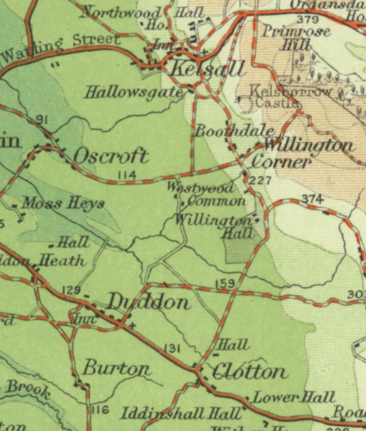For centuries, ordinary Brits have enjoyed a legal “right to ramble” throughout the countryside even when they might cross someone’s private property. In England and Wales alone, there are an estimated 140,000 miles of footpaths and bridlepaths that are considered public rights of way. Now, as reported by the website Boing Boing, the full scope of this right -- and access to a vast network of paths -- is in question.
The legal right to ramble stems from the Charter of the Forest, the 1217 social compact grudgingly ratified by King John that formally recognized commoners’ rights of access to the forest. The right was part of a larger constellation of rights won by commoners after their long struggle with the Crown over who shall have access to the forest – only the King and his lords and retainers, or ordinary people, too? 
Because of the right to ramble, a sprawling network of paths evolved in Great Britain over the centuries, bringing together villages, roads, farms, and natural landmarks throughout the landscape. The pathways were once regarded as vital infrastructure for commerce, social tradition, and everyday convenience. Now the pathways are mostly seen as a beloved cultural heritage and recreational commons. Millions of people roam the pathways every year.
Like so many social limitations on private private property, however, people forget about what belongs to them – while property owners are ever-alert to the prospect of expanding their rights. Many modern-day property owners in England and Wales despise the right to ramble because it limits, however marginally, their absolute, exclusive control of the land.
In 2000, property owners prevailed upon the British Parliament to terminate the ancient right to ramble unless a given pathway has been formally mapped and officially recognized. The Countryside and Rights of Way Act set a deadline for such mapping: January 1, 2026. (Parliament originally set a ten-year deadline.) After 2026, unmapped historic pathways will revert to private property and the public right to ramble on such lands will expire forever.
To counter this threat, the Ramblers – a long-time association of walking enthusiasts dedicated to the sense of freedom and benefits that come from being outdoors on foot” -- has organized a campaign, Don’t Lose Your Way, along with a guidebook for ramblers, “Protect Where You Love to Walk.” The goal: to help a small army of volunteers map all of the pathways in England and Wales by 2026, and in so doing, keep them available to commoners.
This task is difficult because some historic pathways may not exist on any contemporary maps. Many pathways are known only through informal, customary use.Their very existence is known because one generation introduces the next generation to the joy of walking them. The official maps made by local authorities may or may not recognize the paths, and newer maps may omit older, less-used paths. Sometimes unscrupulous landowners have actually altered pathways to discourage people from using them, or to eradicate local memory of them.
The Ramblers say that identifying and verifying the existence of many pathways really requires a “systemic trawling through archives.” There is no other way to be definitive. But this task is plainly impractical. Chances are good that some pathways will be overlooked and lost to private enclosure.
But Brits have a history of standing up for their "right to roam." In a still-remembered episode in 1932, there was a mass trespass on the mountain area known as Kinder Scout -- a deliberate act of civil disobedience by hundreds -- to protest the lack of access to open countryside in England and Wales.
The mapping requirement by Parliament reminds me of other enclosures in modern life. Think how Indians (on the subcontinent) have had to document the medicinal value of hundreds of traditional plants and herbal medicines in order to keep them available to all.Without such documentation, transnational pharmaceutical companies could patent traditional medicines that have been freely used for centuries. Without affirmative evidence marshaled by commoners -- the Traditional Knowledge Digital Library -- Big Pharma could claim private, proprietary control over the biowealth of the commons.
I am also reminded of the way that the music industry used copyright law to privatize the commercial use of the 1858 song "Happy Birthday." Another example of how the culture of commoning is an irresistible target for private commercialization. (Happily, a US federal court declared the copyright of "Happy Birthday" to be invalid in 2016.)
It is encouraging to know that the Ramblers and their allies are on the case. Their campaign to map English and Welsh walking trails serves as another reminder that the rights of commoners cannot be taken for granted. They must be secured through hard work and struggle.

 Beth Broadway of InterFaith Works of Central New York is Announced the Winner of the Paul and Joyce Aicher Leadership in Democracy Award
Beth Broadway of InterFaith Works of Central New York is Announced the Winner of the Paul and Joyce Aicher Leadership in Democracy Award
 Senator Unger is a major advocate for utilizing dialogue and deliberation to engage with constituents. Some of you may know him from the National Issues Forums Board of Directors, or have heard about his work in West Virginia already!
Senator Unger is a major advocate for utilizing dialogue and deliberation to engage with constituents. Some of you may know him from the National Issues Forums Board of Directors, or have heard about his work in West Virginia already!